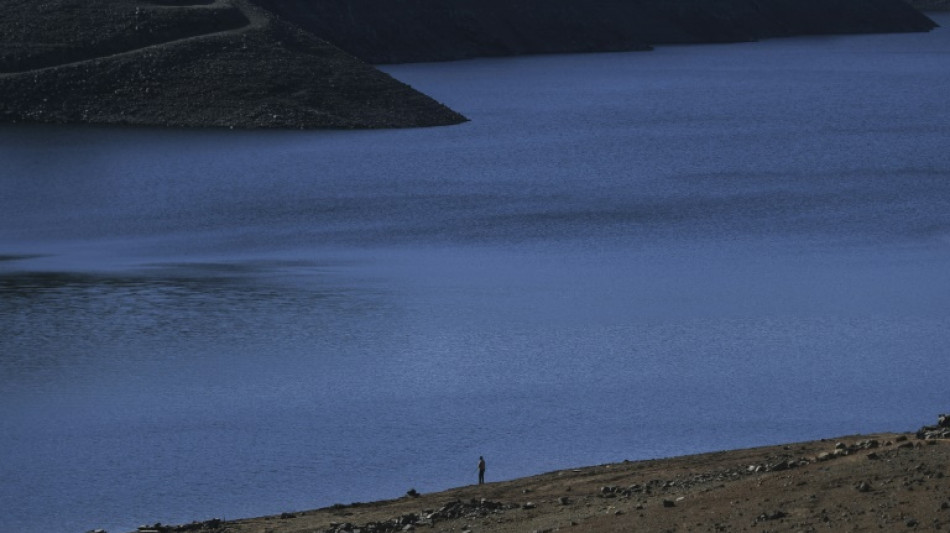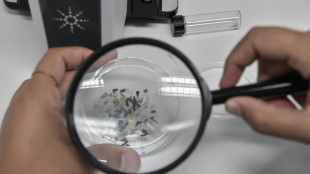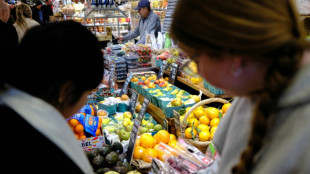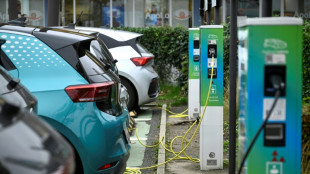
-
 US ouster of Maduro nightmare scenario for Kim: N. Korean ex-diplomat
US ouster of Maduro nightmare scenario for Kim: N. Korean ex-diplomat
-
Svitolina credits mental health break for reaching Melbourne semis

-
 Japan's Olympic ice icons inspire new skating generation
Japan's Olympic ice icons inspire new skating generation
-
Safe nowhere: massacre at Mexico football field sows despair

-
 North Korea to soon unveil 'next-stage' nuclear plans, Kim says
North Korea to soon unveil 'next-stage' nuclear plans, Kim says
-
French ex-senator found guilty of drugging lawmaker

-
 US Fed set to pause rate cuts as it defies Trump pressure
US Fed set to pause rate cuts as it defies Trump pressure
-
Sleeping with one eye open: Venezuelans reel from US strikes

-
 Venezuela's acting president says US unfreezing sanctioned funds
Venezuela's acting president says US unfreezing sanctioned funds
-
KPop Demon Hunters star to open Women's Asian Cup

-
 Trump warns of 'bad things' if Republicans lose midterms
Trump warns of 'bad things' if Republicans lose midterms
-
Russian strikes in Ukraine kill 12, target passenger train

-
 With Maduro gone, Venezuelan opposition figure gets back to work
With Maduro gone, Venezuelan opposition figure gets back to work
-
Celebrities call for action against US immigration raids

-
 Rubio to warn Venezuela leader of Maduro's fate if defiant
Rubio to warn Venezuela leader of Maduro's fate if defiant
-
Denver QB Nix 'predisposed' to ankle injury says coach

-
 Lula, Macron push for stronger UN to face Trump 'Board of Peace'
Lula, Macron push for stronger UN to face Trump 'Board of Peace'
-
Prass stunner helps Hoffenheim go third, Leipzig held at Pauli

-
 Swiss Meillard wins final giant slalom before Olympics
Swiss Meillard wins final giant slalom before Olympics
-
CERN chief upbeat on funding for new particle collider

-
 Trump warns US to end support for Iraq if Maliki returns
Trump warns US to end support for Iraq if Maliki returns
-
Judge reopens sexual assault case against goth rocker Marilyn Manson

-
 South Korea's ex-first lady to learn verdict in corruption case
South Korea's ex-first lady to learn verdict in corruption case
-
Rosenior dismisses Chelsea exit for 'untouchable' Palmer

-
 Markram powers South Africa to win over West Indies
Markram powers South Africa to win over West Indies
-
Vladimir Padrino: Venezuela's military power broker

-
 Amazon closing Fresh and Go stores in Whole Foods push
Amazon closing Fresh and Go stores in Whole Foods push
-
Koepka nervous about game and fans in PGA Tour return

-
 Trump's Iowa trip on economy overshadowed by immigration row
Trump's Iowa trip on economy overshadowed by immigration row
-
Dortmund coach says Inter Milan are improved under Chivu

-
 US border chief in Minneapolis as Trump tries to calm crisis
US border chief in Minneapolis as Trump tries to calm crisis
-
What to know about America's colossal winter storm

-
 Iran warns against 'instability' after US strike group arrives
Iran warns against 'instability' after US strike group arrives
-
GM reports quarterly loss but boosts shareholder returns

-
 US banks fight crypto's push into Main Street
US banks fight crypto's push into Main Street
-
NFL Bills make offensive coordinator Brady new head coach

-
 TikTok settles hours before landmark social media addiction trial
TikTok settles hours before landmark social media addiction trial
-
Newcastle braced for 'ultimate test' against PSG after storm disruption

-
 Brook blitz ends Sri Lanka's unbeaten home run, England clinch series
Brook blitz ends Sri Lanka's unbeaten home run, England clinch series
-
LVMH 2025 net profit drops 13% to 10.9 bn euros

-
 Philip Glass pulls Kennedy Center premiere after Trump takeover
Philip Glass pulls Kennedy Center premiere after Trump takeover
-
Slot says Liverpool must fix 'very bad cocktail'

-
 How to assess microplastics in our bodies? Scientists have a plan
How to assess microplastics in our bodies? Scientists have a plan
-
US sued over deadly missile strikes on alleged drug boats

-
 Trump ally Asfura sworn in as Honduras president
Trump ally Asfura sworn in as Honduras president
-
US border enforcer set to leave Minneapolis as Trump tries to calm crisis

-
 US consumer confidence drops to lowest level since 2014
US consumer confidence drops to lowest level since 2014
-
Teens underwhelmed by France's social media ban

-
 Trump ally Nasry Asfura sworn in as Honduras president
Trump ally Nasry Asfura sworn in as Honduras president
-
BAFTAs nominees in main categories


Spain, Portugal hit by winter drought
In central Portugal, a sustained drought has revealed the ruins of a village that was totally submerged underwater when a large reservoir was created nearly 70 years ago.
"I have never seen that!" says Carlos Perdigao, 76, as he gazes at the ruined stone houses of Vilar which were swallowed up by the Zezere river when a dam was opened in 1954.
Vilar stands on the banks of the river, surrounded by cracked yellow earth, another sign of the ongoing dry spell during what is normally a rainy winter season, with the drought also hitting neighbouring Spain.
Weather services in both countries say it was the second driest January on record since the year 2000.
The current drought is extraordinary because of "its intensity, scale and length", says climate scientist Ricardo Deus of Portugal's meteorology agency IPMA.
Of Portugal's 55 dams, 24 are only holding half of their water capacity, and five are below 20 per cent, according to the European Union's Copernicus Earth observation service.
The Algarve, Portugal’s southernmost province, and one of Europe's top tourism destinations, is one of those most affected by the drought.
Meanwhile Spain only got a quarter of the precipitation it normally gets in January, said the AEMET weather service.
The dry spell, which began at the end of 2021, is ruining crops, leaving farmers struggling to feed livestock and hampering hydroelectricity production.
- 'It's a disaster' -
Earlier this month, Portugal ordered five of its hydropower dams to suspend water use for electricity production in order to prioritise human consumption.
Nearly 30 percent of Portugal's electricity comes from hydropower dams.
And in Spain, Agriculture Minister Luis Planas on Tuesday said the government was "concerned" about the drought and would adopt the "necessary measures" depending on how the situation evolves.
Spain's water reserves are currently at less than 45 percent of their capacity, officials say, with the southern Andalusia region and Catalonia in the northeast worst hit.
Farmers in both countries are worried.
"Look! The grass isn't growing to feed the animals," says Antonio Estevao, a cheese producer who owns a herd of around 30 goats in Portela de Fojo Machio, a village in central Portugal near the town of Pampilhosa da Serra.
"If it doesn't rain in the coming days, it's going to be very complicated," he sighs, gazing at his drought-stressed pastures.
The lack of rain is also jeopardising the town's efforts to draw tourists inland with a floating pool structure set up for bathers in the Zezere river.
But the pool's plastic lining lies slumped on the ground, with the drought forcing the river to recede.
"For us, it's a disaster," says the town's mayor, Henrique Fernandes Marques.
The same area was badly hit by a wave of wildfires that raged through parched farmlands and forests in 2017, claiming over 100 lives.
- No end in sight -
More frequent and intense droughts are expected to put enormous strain on climate-vulnerable regions as temperatures rise, and will likely heighten the risk of related natural disasters such as wildfires, scientists say.
While the alternation between dry and wet years is normal in southern Europe, "we have observed a decline in the percentage of rainy years lately," said Filipe Duarte Santos, an environment specialist at Lisbon University.
These droughts are "one of the most serious consequences of climate change," he added.
"Until greenhouse gas emissions are drastically reduced, the problem will continue."
The situation is not likely to improve in the coming weeks as forecasters expect rainfall in both countries to be below the seasonal average.
Faced with this reality, the Portuguese government on Thursday said it would boost its cooperation with Spain to fight the drought.
N.Fournier--BTB


